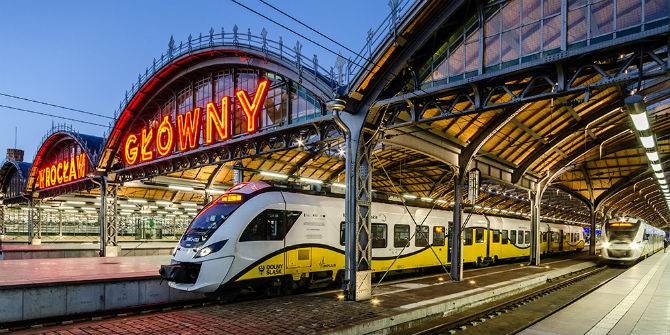 Growing numbers of Central-Eastern Europeans are leaving the UK, while new arrivals are falling. This is what Leavers wanted – but it is a boon to the rest of the EU and a loss to the UK, writes Simeon Djankov. The returnees are bringing home skills, business acumen and – most importantly – experience of a society without systemic corruption.
Growing numbers of Central-Eastern Europeans are leaving the UK, while new arrivals are falling. This is what Leavers wanted – but it is a boon to the rest of the EU and a loss to the UK, writes Simeon Djankov. The returnees are bringing home skills, business acumen and – most importantly – experience of a society without systemic corruption.
The UK is no longer as attractive to European nationals thinking of coming to live and work here. The latest quarterly figures published by the Office for National Statistics show there is a 36% increase in the number of EU citizens leaving the UK to return home permanently (to 117,000) and a 14% decrease in first-time EU entrants to the UK job market (to 247,000) compared to 2015. This negative trend is particularly pronounced for Central Europeans, who have stopped relocating to the UK. The UK’s loss is Europe’s gain: students and workers will look for opportunities at home or in other European economies. This trend increases the long-term growth prospects for Europe, to the detriment of the United Kingdom.

As economic indicators have been benign, the shift in EU citizens’ attitudes towards the UK is primarily due to the result of the Brexit referendum. The British economy finished 2016 with economic growth of 1.8% of GDP, higher than any other G7 country. However, the British currency lost nearly 15% of its value relative to the euro after Brexit, reducing the expected wages for EU citizens who are contemplating a move from their home country. The second reason is an increase in hostility towards Central European workers.
Brexit has particularly affected the flow of Polish citizens, who for more than a decade accounted for the largest net migration. This is no longer the case, as Romania has overtaken Poland as the main source of net migration. Overall migration from Central Europe is at a standstill: only 5,000 more people from the eight Central European countries (the Czech Republic, Estonia, Hungary, Latvia, Lithuania, Poland, Slovakia and Slovenia) have relocated to the UK than left for another EU country, the lowest net inflow since these countries joined the European Union in 2004. This is a tenth of the net inflow in 2015, and one percent of the net inflow a decade earlier.
The only Europeans still attracted to the UK are from the latest EU entrants: Bulgaria and Romania. Net migration from Bulgaria and Romania continues to be positive in 2016 (54,000 people) but smaller than in 2015. A quarter of a million Bulgarians and Romanians legally registered for work in the UK between March 2016 and March 2017. On this score, Romania leads all countries, while Bulgaria is fifth behind Poland, Italy and Spain. With Romania’s economy gathering speed and outperforming all other European economies in 2016, the flow of Romanian workers to the UK is dwindling as well. These workers, too, may prefer to explore opportunities at home.
The falling attractiveness of the UK for European citizens, particularly from Central Europe, may at first glance be interpreted as a success of the Tory government. After all, this is what Brexit was mostly about: keeping jobs for British nationals. A more-than-cursory look at the UK employment statistics shows reasons for worry. The construction, retail, hospitality, catering, home care and agricultural sectors critically depend on Central and East European workers. They will be hard to replace with domestic workers, who find such jobs unsatisfactory and frequently reject them out of a sense of entitlement. Less recognised is that Central Europeans also account for a non-negligible share of employment in some professional services such as healthcare (7%), information technology (5% of employed workers) and accounting and auditing (3% of employed workers).
Returning EU workers are a boon for their home economies. They have acquired language and professional skills in the UK, and have learnt better business practices. The new skills can be put to use to assist their economies in converging with Western Europe.
Perhaps most importantly, returning workers have grown accustomed to a system without significant corruption and neglect of the rule of law. Their support for such a governance system at home is the most important asset they bring when returning from the UK.
This post represents the views of the author and not those of the Brexit blog, nor the LSE.
Simeon Djankov is Executive Director of the Financial Markets Group at the LSE. He was deputy prime minister and minister of finance of Bulgaria from 2009 to 2013.
Also by this author: The biggest threat to the City of London is now uncertainty
Why a soft Brexit is in the interest of both London and Brussels







“who find such jobs unsatisfactory and frequently reject them out of a sense of entitlement. ”
1st. The fall in the pound will have played a large part in the UK’s unattractiveness. Which brings me to the ‘sense of entitlement’ angle.
While I’m sure that, when asked why they don’t want these jobs in hospitality, some might mention (in terms) that “such work is for ‘foreigners”‘:I seriously doubt this is a powerful or frequent point.
The fact that the Pound was strong against the Euro was doubtless more than enough of a bonus for the job-starved of Easter Europe to come here and stomach the conditions and the low wages.
There was never any such bonus for the indigenous workforce;who would still have had to sustain their lives in the UK, with domestic expenses such as rent. This would more stark still with seasonal work.
In any case. Brexit will continue to be a disaster with regard to the UK’s attractiveness to the continental EU citizen workforce:No amount of finessing with their right to remain can hope to bring us back to the times of relative contentment – prior to June 2016.
The sooner the next Government faces up to this the better, especially if its a Corbyn Government. For the UK’s reliance upon continental EU citizens is no more evident than with our NHS.
So much trouble, from so many lies – coupled with the absence of a pro-EU Campaign in the run-up to last June’s ‘advisory’ referendum.
“…this is what Leavers wanted…..” demonstates shallow and inaccurate thinking.
All of the Leavers that I know voted to be free from government by an unelected elite who have no accountability to the relevant electorate.
What a boon for Poland, and for the rest of the EU, which will need a leg-up.Brexit sofar has done wonders for the rest of the EU.I cannot work out why Brexit is so unpopular with EU-philes.The sky would fall in, which it might still, but more likely due to EU cack-handed foreign policy of the last two decades.
Now for the UK.Imagine that a small number of UK expats from around the world come home to retire, semi-retire or take up the slack left by departing-in-disgust EU continentals.So much experience had in the rest of the world, like Oz, Godzone(New Zealand for those not au fait), the US, Honkers, etc.,etc.Wonderful!I have been looking for a property in the UK for some years now(Still saving up for retirement.
Anyway, reduced economic activity will be so good for the environment.People who care about this world, or their own careers, keep going on about global warming.Well, reduced economic activity is the only way to reduce the output of greenhouse gasses.
Voelkerwanderung.
Always happened, always will. Not in politicians’ power to control. A huge benefit when in the context of a civilized society such as the EU.
And in today’s politicians’ power to make sure that it does not cause unnecessary burdens for communities where there are more immigrants than in others, such as in the East Midlands.
That is not the EU’s fault – it rests entirely with this government for not listening and certainly not hearing peoples’ concerns for example in Peterborough and providing some extra resources. Failed government, therefore.
Still – Voelkerwanderung: Those children of Polish parents will be English children soon. Born to very hard working parents who took a risk moving abroad and learning a language to try and improve their family’s life chances. Some Brits should try and do that?
Ah, some Brits will soon have to try and do that. That will be funny!